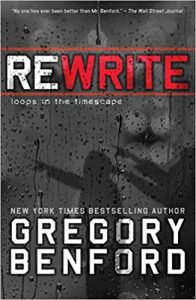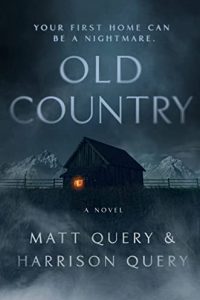Gary K. Wolfe Reviews Rewrite: Loops in the Timescape by Gregory Benford
 Rewrite: Loops in the Timescape, Gregory Benford (Saga 978-1-5344-1127-2, $27.99, 368pp, hc), January 2019.
Rewrite: Loops in the Timescape, Gregory Benford (Saga 978-1-5344-1127-2, $27.99, 368pp, hc), January 2019.
It’s been nearly four decades since Gregory Benford’s classic, multiple award-winning Timescape, which was lauded as much for its convincing portrayal of working scientists as for its ingenious notion of tachyonic cross-time communication. Benford describes Rewrite as a “conceptual sequel” to that novel, but for the most part the scientists in it are walk-on celebrities – including Einstein, Hugh Everett, and even Benford himself (very thinly disguised as his twin brother James) – rather than working drudges struggling for promotions and publication, and maybe saving the world from ecological doom. That’s only one of many contrasts between the two novels. Timescape was as rigorous as Benford could make it in terms of the physics of communication with the past (the warning signals from 1998 had to be beamed toward the astronomical location of Earth in 1962, something nearly all time travel tales conveniently overlook), but Rewrite opens with an event that might as well be magical: historian Charlie Moment is killed in an auto accident in 2000 and wakes up in his own 16-year-old body back home in 1968. Timescape was a deeply character-driven work which pioneered a variety of literary hard SF (later taken up by Paul McAuley, Alastair Reynolds, and others) and ended with a rather somber, bleak future in a dying timeline. Rewrite, on the other hand, may be the most playful novel Benford has written in years, one which asks, among other things, what Back to the Future might have been like if Robert A. Heinlein and Albert Einstein had been involved in its production.
There are plenty of other examples of such playfulness. In an afterword, Benford describes the plot as a deliberate puzzle in which the reader needs to untangle the various timelines that eventually get introduced, making the whole novel something of a game. And Benford makes it clear that he’s aware he’s working in a very specific tradition of time-loop tales, mentioning Jack Finney’s Time and Again, Ken Grimwood’s Replay (in which the protagonist also dies and wakes up in his teenage body in the 1960s), and even movies like Back to the Future and Peggy Sue Got Married. Back to the Future, in fact, turns out to be one of Charlie’s own productions, since he’s decided to take advantage of his knowledge of movies of the 1970s and 1980s to become a successful screenwriter and producer, largely by helping to create those very movies. Much of the first half of the novel reads like a Hollywood satire, more resonant of Nathanael West or the late Fitzgerald than of hard SF. For example, Charlie shrewdly bluffs Marlon Brando’s agent into signing him onto The Godfather with the threat of Steve McQueen taking the role instead. He’s also aware of the eventual commercial potential of Philip K. Dick, and persuades Dick to work with him on a script of The Man in the High Castle. Dick isn’t the only guest celebrity in this part of the novel, though; Spielberg shows up, as does (briefly) George Lucas. There’s more than a slight undertone of an old Playboy fantasy of making it in Hollywood, complete with a few too many and too disposable women characters throwing themselves at Charlie once he becomes a player. (In fact, the only substantial female character is Elspeth, a radical professor who is Charlie’s ex-wife in his original life and a rather unpleasant nemesis in his other lives.)
Then the novel effectively breaks in half. While climbing the Hollywood ladder, Charlie has also been trying to find a rational explanation for what’s happened to him, which leads him to Hugh Everett’s many-worlds interpretation of quantum mechanics and even to a meeting with Everett himself. Suspecting there may be others like himself, he hires a private eye, who suggests he read Timescape (leading to his meeting the author, “James Benford”) and who later leaves a cryptic phone message that eventually leads him to a mysterious address in Manhattan. Here he learns of a secret society of “reincarnates,” some of whom have lived for centuries, some of whom can even switch bodies, and some of whom are Robert and Ginny Heinlein, Albert Einstein, and Casanova, reimagined here as a rather louche sort of time lord. Now the tale takes on aspects of both stories like Poul Anderson’s Time Patrol series or Asimov’s The End of Eternity as well as Fortean notions of secret masters, as various factions compete to manipulate the timelines. This leads to some pretty satisfying adventure sequences involving mysterious assassins and Heinlein acting out his own competent-man scenarios, and to Charlie reconsidering the possibilities of his own role in this expanded universe. The result is a good deal of fun mixed with some more up-to-date speculations on quantum entanglement – the sense in which the novel is really a “conceptual sequel” to Timescape – as well as elements of the kinetic thrillers Benford has been experimenting with for some years now, but it’s not quite a return to the deeply character driven, almost meditative concern with the politics, philosophy, and impact of academic science of the original Timescape.
Gary K. Wolfe is Emeritus Professor of Humanities at Roosevelt University and a reviewer for Locus magazine since 1991. His reviews have been collected in Soundings (BSFA Award 2006; Hugo nominee), Bearings (Hugo nominee 2011), and Sightings (2011), and his Evaporating Genres: Essays on Fantastic Literature (Wesleyan) received the Locus Award in 2012. Earlier books include The Known and the Unknown: The Iconography of Science Fiction (Eaton Award, 1981), Harlan Ellison: The Edge of Forever (with Ellen Weil, 2002), and David Lindsay (1982). For the Library of America, he edited American Science Fiction: Nine Classic Novels of the 1950s in 2012, with a similar set for the 1960s forthcoming. He has received the Pilgrim Award from the Science Fiction Research Association, the Distinguished Scholarship Award from the International Association for the Fantastic in the Arts, and a Special World Fantasy Award for criticism. His 24-lecture series How Great Science Fiction Works appeared from The Great Courses in 2016. He has received six Hugo nominations, two for his reviews collections and four for The Coode Street Podcast, which he has co-hosted with Jonathan Strahan for more than 300 episodes. He lives in Chicago.
This review and more like it in the January 2019 issue of Locus.
 While you are here, please take a moment to support Locus with a one-time or recurring donation. We rely on reader donations to keep the magazine and site going, and would like to keep the site paywall free, but WE NEED YOUR FINANCIAL SUPPORT to continue quality coverage of the science fiction and fantasy field.
While you are here, please take a moment to support Locus with a one-time or recurring donation. We rely on reader donations to keep the magazine and site going, and would like to keep the site paywall free, but WE NEED YOUR FINANCIAL SUPPORT to continue quality coverage of the science fiction and fantasy field.







Another one on the waiting-to-read pile…
It is very interesting how different the same story trope is treated in US and in Easter Europe. Here the protagonist makes a career in Hollywood, get rick and goes after women, In the modern Russian SF there is a sub-genre called попаданская фантастiка (fallen-in SF) which strictly speaking is AltHistory, where the protagonist goes back to the past and tries to “upgrade” their country. In a large fraction of such books the character appears just before the WWII and tries to change the course of the war. The running joke is about a hero who goes to Stalin with a notebook full of drawings of future weapons. I have heard about a Polish movie along the same lines (minus Stalin). My country has its own share too. The closest Western analog that I know of to all this is Guns for the South by Harry Turtledove.
I appreciate your dissection and analysis of this as a subgenre of SF that seems to be influenced by the country of origin.
I think you are on to something. The reasons for these differences are possibly a reaction to the culture of the authors. With the Mythos of Success dependent on the overall culture versus a rational desire.
But in any case, a winning analysis. Thank you.
I had the great good fortune to listen to Bradford on The Geeks Guide to the Galaxy.
He does a good job of explaining his thought process of the physics behind the book’s premise.
I might suggest listening to it before reading the book as it works as more of a primer to the work and shows a man who has seemingly known most of the scientific fiction writers he embeds into this book.
He also did the Hollywood thing until he burned out.
To quote our favorite Vulcan: Fascinating.